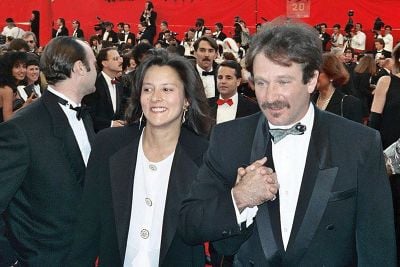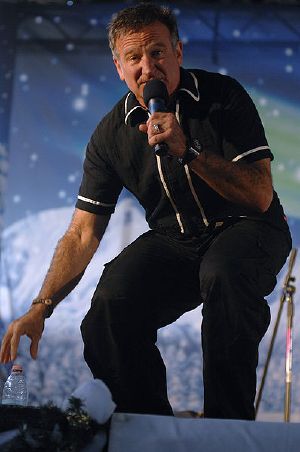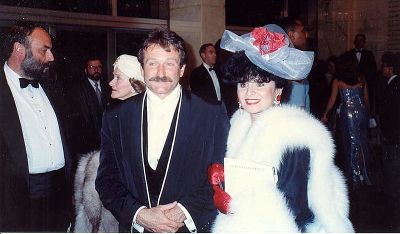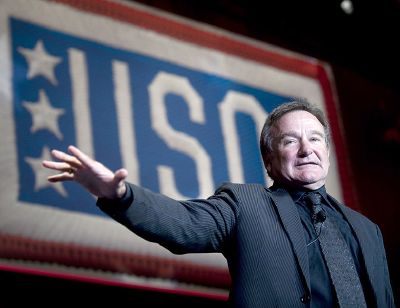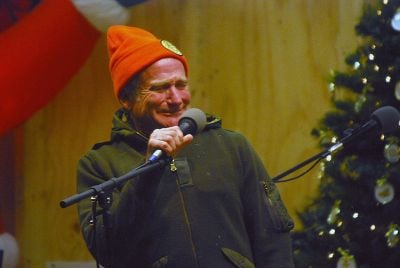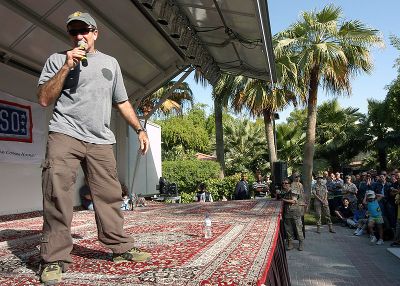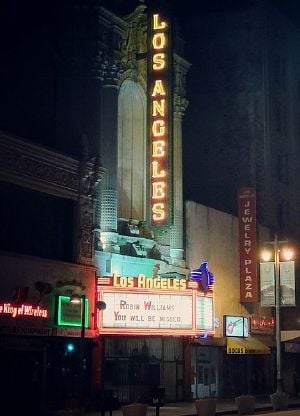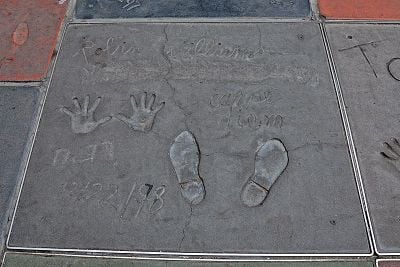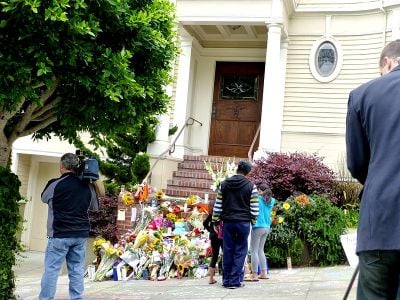Robin Williams
| Robin Williams | |
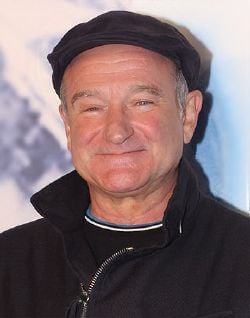 Robin Williams in 2011
| |
| Born | Robin McLaurin Williams July 21 1951 Chicago, Illinois, U.S. |
|---|---|
| Died | August 11 2014 (aged 63) Paradise Cay, California, U.S. |
| Education |
|
| Occupation | Actor, comedian |
| Years active | 1976–2014 |
| Spouse(s) |
|
| Children | Zelda, Zachary, and Cody |
Robin McLaurin Williams (July 21, 1951 – August 11, 2014) was an American actor and comedian. Known for his improvisational skills and the wide variety of characters he created on the spur of the moment and portrayed on film, in dramas and comedies alike, he is regarded as one of the best comedians of all time.
Williams began performing stand-up comedy in San Francisco and Los Angeles during the mid-1970s, and rose to fame playing the alien Mork in the ABC sitcom Mork & Mindy (1978–1982). After his first starring film role in Popeye (1980), he starred in several critically and commercially successful films including The World According to Garp (1982), Moscow on the Hudson (1984), Good Morning, Vietnam (1987), Dead Poets Society (1989), Awakenings (1990), The Fisher King (1991), Patch Adams (1998), One Hour Photo (2002), and World's Greatest Dad (2009). He also starred in box office successes such as Hook (1991), Aladdin (1992), Mrs. Doubtfire (1993), Jumanji (1995), The Birdcage (1996), Good Will Hunting (1997), and the Night at the Museum trilogy (2006–2014). He was nominated for four Academy Awards, winning Best Supporting Actor for Good Will Hunting. He also received two Primetime Emmy Awards, six Golden Globe Awards, two Screen Actors Guild Awards, and five Grammy Awards.
On August 11, 2014, at age 63, Williams died by suicide at his home in Paradise Cay, California. His autopsy revealed undiagnosed Lewy body disease. The world reacted in shock on hearing that this beloved actor who had made everyone laugh was gone in such a tragic fashion. Despite the tragedy of the end of Williams' life, his ability to bringing joy to world remains an inspirational legacy.
Life
Robin McLaurin Williams was born a in Chicago, Illinois,[1] on July 21, 1951. His father, Robert Fitzgerald Williams, was a senior executive in Ford's Lincoln-Mercury Division.[2] His mother, Laurie McLaurin, was a former model from Jackson, Mississippi, whose great-grandfather was Mississippi senator and governor Anselm J. McLaurin.[3] Williams had two elder half-brothers: paternal half-brother Robert (also known as Todd) and maternal half-brother McLaurin. While his mother was a practitioner of Christian Science, Williams was raised in his father's Episcopal faith.
Williams attended public elementary school in Lake Forest at Gorton Elementary School and middle school at Deer Path Junior High School.[4] His friends recall him as "pretty reserved, quiet and shy" but they saw "flashes of comedic brilliance."[4] In late 1963, when Williams was 12, his father was transferred to Detroit. The family lived in a 40-room farmhouse on 20 acres[2] in suburban Bloomfield Hills, Michigan, where he was a student at the private Detroit Country Day School.[5] He excelled in school, where he was on the school's wrestling team and was elected class president.[6]
When he was 16, his father took early retirement and the family moved to Tiburon, California.[2] Following their move, Williams attended Redwood High School in nearby Larkspur. At the time of his graduation in 1969, he was voted "Most Likely Not to Succeed" and "Funniest" by his classmates.[7] After high school graduation, Williams enrolled at Claremont Men's College in Claremont, California, to study political science; he dropped out to pursue acting.[2] Williams studied theatre for three years at the College of Marin, a community college in Kentfield, California. According to College of Marin's drama professor James Dunn, the depth of the young actor's talent became evident when he was cast in the musical Oliver! as Fagin. Williams often improvised during his time in the drama program, leaving cast members in hysterics. Dunn called his wife after one late rehearsal to tell her Williams "was going to be something special."[8]
In 1973, Williams attained a full scholarship to the Juilliard School, 1973–1976) in New York City. He was one of 20 students accepted into the freshman class, and he and Christopher Reeve were the only two accepted by John Houseman into the Advanced Program at the school that year. William Hurt and Mandy Patinkin were also classmates.[9][10] Reeve remembered his first impression of Williams when they were new students at Juilliard:
He wore tie-dyed shirts with tracksuit bottoms and talked a mile a minute. I'd never seen so much energy contained in one person. He was like an untied balloon that had been inflated and immediately released. I watched in awe as he virtually caromed off the walls of the classrooms and hallways. To say that he was 'on' would be a major understatement.[10]
Williams and Reeve had a class in dialects taught by Edith Skinner, who Reeve said was one of the world's leading voice and speech teachers; according to Reeve, Skinner was bewildered by Williams and his ability to instantly perform in many different accents. Their primary acting teacher was Michael Kahn, who was "equally baffled by this human dynamo."[10] Williams already had a reputation for being funny, but Kahn criticized his antics as simple stand-up comedy. In a later production, Williams silenced his critics with his well-received performance as an old man in Tennessee Williams's Night of the Iguana. Reeve wrote, "He simply was the old man. I was astonished by his work and very grateful that fate had thrown us together."[10] The two remained close friends until Reeve's death in 2004. Their friendship was such that "Chris and Dad became family, brothers from another mother," according to Williams's son Zak.[11]
He left Juilliard during his junior year in 1976 at the suggestion of Houseman, who said there was nothing more Juilliard could teach him.[9] Gerald Freedman, another of his teachers at Juilliard, said Williams was a "genius" and that the school's conservative and classical style of training did not suit him; no one was surprised that he left.[12]
Marriages and children
Williams married his first wife, Valerie Velardi, in June 1978. Velardi and Williams met in 1976 while he was working as a bartender at a tavern in San Francisco. Their son Zachary Pym "Zak" Williams was born in 1983. Velardi and Williams were divorced in 1988.[13]
While it was reported that Williams began an affair with Zachary's nanny Marsha Garces in 1986, Velardi stated in the 2018 documentary Robin Williams: Come Inside My Mind that the relationship with Garces began after the two had separated.[14] On April 30, 1989, Williams married Garces, and they had two children, Zelda Rae Williams (born 1989) and Cody Alan Williams (born 1991). In March 2008, Garces filed for divorce from Williams, citing irreconcilable differences. Their divorce was finalized in 2010.
Williams married his third wife, graphic designer Susan Schneider, on October 22, 2011, in St. Helena, California. The two lived in California until his death in 2014.
Addiction
During the late 1970s and early 1980s, Williams had an addiction to cocaine.[15][16] He was a casual friend of John Belushi,[17] and the Saturday Night Live comic's death in 1982 from a drug overdose, which happened the morning after the two had partied together, along with the birth of his own son Zak, prompted him to quit drugs and alcohol: "Was it a wake-up call? Oh yeah, on a huge level. The grand jury helped, too."[15]
Williams turned to exercise and cycling to help alleviate his depression shortly after Belushi's death; according to bicycle shop owner Tony Tom, Williams said, "cycling saved my life."[18]
In 2003, Williams started drinking again while working on a film in Alaska.[16] In 2006, he checked himself in to a substance-abuse rehabilitation center in Newberg, Oregon, saying he was an alcoholic.[19] Years afterward, Williams acknowledged his failure to maintain sobriety, but said he never returned to using cocaine, declaring in a 2010 interview:
No. Cocaine—paranoid and impotent, what fun. There was no bit of me thinking, ooh, let's go back to that. Useless conversations until midnight, waking up at dawn feeling like a vampire on a day pass. No.[16]
In mid-2014, Williams admitted himself into the Hazelden Foundation Addiction Treatment Center in Center City, Minnesota, for treatment for alcoholism.[20]
Later health problems
In March 2009, Williams was hospitalized due to heart problems. He postponed his one-man tour for surgery to replace his aortic valve, repair his mitral valve, and correct his irregular heartbeat.[21]
He was suffering from severe depression and his wife, Susan Schneider, said that in the period before his death, Williams had been sober, but was diagnosed with early-stage Parkinson's disease, which was information he was "not yet ready to share publicly."[22]
Death
Williams was found dead in his home in Paradise Cay, California on August 11, 2014.[23] The autopsy report, released in November 2014, concluded that Williams' death was a suicide resulting from asphyxia due to hanging. Neither alcohol nor illegal drugs were involved, and prescription drugs present in his body were at therapeutic levels. The report also noted that Williams had been suffering from depression and anxiety.[24]
An examination of his brain tissue suggested Williams suffered from "diffuse Lewy body dementia." This may have contributed to his depression.[25] According to his widow, Susan Schneider Williams, "Robin was losing his mind and he was aware of it ... He kept saying, 'I just want to reboot my brain.'"[26]
Describing the disease as "the terrorist inside my husband's brain," she said that "however you look at it—the presence of Lewy bodies took his life," referring to his previous diagnosis of Parkinson's.[26] She revealed that in the year before his death, Williams had experienced a sudden and prolonged spike in fear and anxiety, depression, and insomnia, which worsened in severity to include memory loss, paranoia, and delusions. Medical experts had struggled to determine a cause, and eventually diagnosed him with Parkinson's disease.[26]
Williams' body was cremated at Monte's Chapel of the Hills in San Anselmo, and his ashes were scattered over San Francisco Bay on August 21, 2014.[27]
Career
Stand-up comedy
Williams began performing stand-up comedy in the San Francisco Bay Area in 1976.[28] In the 1960s, San Francisco was a center for a rock music renaissance, hippies, drugs, and a sexual revolution, and in the late 1970s, Williams helped lead its "comedy renaissance," writes critic Gerald Nachman.[29] Williams says he found out about "drugs and happiness" during that period, adding that he saw "the best brains of my time turned to mud."[9]
Williams moved to Los Angeles and continued performing stand-up at clubs including The Comedy Store. There, in 1977, he was seen by TV producer George Schlatter, who asked him to appear on a revival of his show Laugh-In. The show aired in late 1977 and was his debut TV appearance.[9] While the Laugh-In revival failed, it led Williams into his television career; he continued performing stand-up at comedy clubs such as the Roxy to help keep his improvisational skills sharp.[9]
With his success on Mork & Mindy, Williams began to reach a wider audience with his stand-up comedy, starting in the late 1970s and throughout the 1980s, including three HBO comedy specials: Off The Wall (1978), An Evening with Robin Williams (1983), and A Night at the Met (1986).[30] Williams won a Grammy Award for Best Comedy Album for the recording of his 1979 live show at the Copacabana in New York, Reality ... What a Concept.[31]
David Letterman, who knew Williams for nearly 40 years, recalls seeing him first perform as a new comedian at The Comedy Store in Hollywood, where Letterman and other comedians had already been doing stand-up. "He came in like a hurricane", said Letterman, who said he then thought to himself, "Holy crap, there goes my chance in show business."[32]
Williams said that partly due to the stress of performing stand-up, he started using drugs and alcohol early in his career. He further said that he neither drank nor took drugs while on stage, but occasionally performed when hung over from the previous day. During the period he was using cocaine, he said it made him paranoid when performing on stage.[17]
Williams once described the life of stand-up comedians:
It's a brutal field, man. They burn out. It takes its toll. Plus, the lifestyle—partying, drinking, drugs. If you're on the road, it's even more brutal. You gotta come back down to mellow your ass out, and then performing takes you back up. They flame out because it comes and goes. Suddenly they're hot, and then somebody else is hot. Sometimes they get very bitter. Sometimes they just give up. Sometimes they have a revival thing and they come back again. Sometimes they snap. The pressure kicks in. You become obsessed and then you lose that focus that you need.[29]
Some, such as the critic Vincent Canby, were concerned that his monologues were so intense it seemed as though at any minute his "creative process could reverse into a complete meltdown."[33] His biographer, Emily Herbert, described his "intense, utterly manic style of stand-up [which sometimes] defies analysis ... [going] beyond energetic, beyond frenetic ... [and sometimes] dangerous ... because of what it said about the creator's own mental state".[33]
Williams felt secure that he would not run out of ideas, as the constant change in world events would keep him supplied.[17] He also explained that he often used free association of ideas while improvising in order to keep the audience interested. The competitive atmosphere caused problems; for example, some comedians accused him of stealing their jokes, which Williams strongly denied.[17] David Brenner claimed that he confronted Williams's agent and threatened bodily harm if he heard Williams utter another one of his jokes.[34] Whoopi Goldberg defended him, asserting that it is difficult for comedians not to reuse another comedian's material, and that it is done "all the time."[35] He later avoided going to performances of other comedians to deter similar accusations.[35]
During a Playboy interview in 1992, Williams was asked whether he ever feared losing his balance between his work and his life. He replied, "There's that fear—if I felt like I was becoming not just dull but a rock, that I still couldn't speak, fire off or talk about things, if I'd start to worry or got too afraid to say something. ... If I stop trying, I get afraid." While he attributed the recent suicide of novelist Jerzy Kosiński to his fear of losing his creativity and sharpness, Williams felt he could overcome those risks. For that, he credited his father for strengthening his self-confidence, telling him to never be afraid of talking about subjects which were important to him.[17]
Williams's stand-up work was a consistent thread through his career, as seen by the success of his one-man show (and subsequent DVD) Robin Williams: Live on Broadway (2002). After a six-year hiatus, in August 2008, Williams announced a new 26-city tour, Weapons of Self-Destruction. The tour began at the end of September 2009 and concluded in New York on December 3, and was the subject of an HBO special on December 8, 2009.[36]
Television
Mork & Mindy
After the Laugh-In revival and appearing in the cast of The Richard Pryor Show on NBC, Williams was cast by Garry Marshall as the alien Mork in a 1978 episode of the TV series Happy Days, "My Favorite Orkan."[9][15] Sought after as a last-minute cast replacement for a departing actor, Williams impressed the producer with his quirky sense of humor when he sat on his head when asked to take a seat for the audition. As Mork, Williams improvised much of his dialogue and physical comedy, speaking in a high, nasal voice, and he made the most of the script. The cast and crew, as well as TV network executives were deeply impressed with his performance. The executives moved quickly to get the performer on contract just four days later before competitors could make their own offers.[37]
Mork's appearance proved so popular with viewers that it led to the spin-off television sitcom Mork & Mindy, which co-starred Pam Dawber, and ran from 1978 to 1982; the show was written to accommodate his extreme improvisations in dialogue and behavior. Although he portrayed the same character as in Happy Days, the series was set in the present in Boulder, Colorado, instead of the late 1950s in Milwaukee. Mork & Mindy at its peak had a weekly audience of sixty million and was credited with turning Williams into a "superstar."[9]
Mork & Mindy was such a success in its first season that Williams appeared on the March 12, 1979, cover of Time magazine. The cover photo, taken by Michael Dressler in 1979, was installed in the National Portrait Gallery in the Smithsonian Institution shortly after his death to allow visitors to pay their respects. This photo is said to have "[captured] his different sides: the funnyman mugging for the camera, and a sweet, more thoughtful pose that appears on a small TV he holds in his hands."[38] Williams also appeared on the cover of the August 23, 1979, issue of Rolling Stone, photographed by Richard Avedon.
Later appearances
Starting in the late 1970s and throughout the 1980s, Williams began to reach a wider audience with his stand-up comedy, including three HBO comedy specials, Off the Wall (1978), An Evening with Robin Williams (1983), and A Night at the Met (1986). In 1986, Williams co-hosted the 58th Academy Awards. He was also a regular guest on various talk shows, including The Tonight Show Starring Johnny Carson and Late Night with David Letterman, on which he appeared 50 times.[32]
Williams' many television appearances included an episode of Whose Line Is It Anyway?, and he starred in an episode of Law & Order: Special Victims Unit. In 2006, Williams was the Surprise Guest at the Nickelodeon Kids' Choice Awards and appeared on an episode of Extreme Makeover: Home Edition that aired on January 30.
In 2010, he appeared in a sketch with Robert De Niro on Saturday Night Live, and in 2012, guest-starred as himself in two FX series, Louie and Wilfred. In May 2013, CBS started a new series, The Crazy Ones, starring Williams and Sarah Michelle Gellar, but the show was canceled after one season.
Film
The first film role credited to Robin Williams is a small part in the 1977 low-budget comedy Can I Do It... 'Til I Need Glasses?. His first starring performance, however, is as the title character in Popeye (1980), in which Williams showcased the acting skills previously demonstrated in his television work; accordingly, the film's commercial disappointment was not blamed on his performance. He went on to star as the leading character in The World According to Garp (1982), continuing with several smaller roles in less successful films, such as The Survivors (1983) and Club Paradise (1986), though he said these roles did not help advance his film career.
His first major break came from his starring role in director Barry Levinson's Good Morning, Vietnam (1987), which earned Williams a nomination for the Academy Award for Best Actor.[15] The film is set in 1965 during the Vietnam War, with Williams playing the role of Adrian Cronauer, a radio shock jock who keeps the troops entertained with comedy and sarcasm. Williams was allowed to play the role without a script, improvising most of his lines. Over the microphone, he created voice impressions of people, including Walter Cronkite, Gomer Pyle, Elvis Presley, Mr. Ed, and Richard Nixon. "We just let the cameras roll," said producer Mark Johnson, and Williams "managed to create something new for every single take."[39]
Dramatic roles
Many of his subsequent roles were in comedies tinged with pathos. In 1989, Williams played a private-school English teacher in Dead Poets Society, which included a final, emotional scene that "inspired a generation" and became a part of pop culture.[40] Similarly, his performance as a therapist in Good Will Hunting (1997) deeply affected even some real therapists.[41] In Awakenings (1990), Williams plays a doctor modeled after Oliver Sacks, who wrote the book on which the film is based. Sacks later said the way the actor's mind worked was a "form of genius." In 1991, he played an adult Peter Pan in the film Hook. Terry Gilliam, who directed Williams in two of his films, The Fisher King (1991) and The Adventures of Baron Munchausen (1988), said in 1992 that Williams had the ability to "go from manic to mad to tender and vulnerable ... [Williams had] the most unique mind on the planet. There's nobody like him out there."[17]
Other dramatic films in which Williams starred include Moscow on the Hudson (1984), What Dreams May Come (1998), and Bicentennial Man (1999). In Insomnia (2002), Williams portrayed a murderer on the run from a sleep-deprived Los Angeles police detective (played by Al Pacino) in rural Alaska. Also in 2002, in the psychological thriller One Hour Photo, Williams portrayed an emotionally disturbed photo development technician who becomes obsessed with a family for whom he has developed pictures for a long time. The last film of Williams's released during his lifetime was The Angriest Man in Brooklyn, in which Williams played Henry Altmann, an angry, bitter man who reassesses his life and works to redeem himself after being told he has a terminal illness.
His roles in comedy and dramatic films garnered Williams several accolades, including an Academy Award for Best Supporting Actor for his role in Good Will Hunting; as well as two previous Academy Award nominations, for Dead Poets Society, and as a troubled homeless man in The Fisher King, respectively.[15]
Among the actors who helped him during his acting career, he credited Robert De Niro, from whom he learned the power of silence and economy of dialogue when acting. From Dustin Hoffman, with whom he co-starred in Hook, he learned to take on totally different character types, and to transform his characters by extreme preparation. Mike Medavoy, producer of Hook, told its director, Steven Spielberg, that he intentionally teamed up Hoffman and Williams for the film because he knew they wanted to work together, and that Williams welcomed the opportunity of working with Spielberg.[42] Williams benefited from working with Woody Allen, who directed him and Billy Crystal in Deconstructing Harry (1997), as Allen had knowledge of the fact that Crystal and Williams had often performed together on stage.[43]
Voice roles
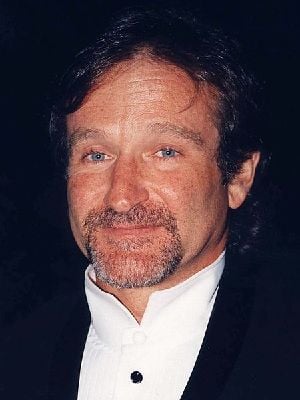
Williams voiced characters in several animated films. His voice role as the Genie in the animated musical Aladdin (1992) was written for him. The film's directors said they had taken a risk by writing the role. At first, Williams refused the role since it was a Disney movie, and he did not want the studio profiting by selling merchandise based on the movie. He accepted the role with certain conditions:
I'm doing it basically because I want to be part of this animation tradition. I want something for my children. One deal is, I just don't want to sell anything—as in Burger King, as in toys, as in stuff."[44]
Williams improvised much of his dialogue, recording approximately 30 hours of tape,[2] and impersonated dozens of celebrities, including Ed Sullivan, Jack Nicholson, Robert De Niro, Groucho Marx, Rodney Dangerfield, William F. Buckley Jr., Peter Lorre, Arnold Schwarzenegger, and Arsenio Hall.[45] His role in Aladdin became one of his most recognized and best-loved, and the film was the highest-grossing of 1992; it won numerous awards, including a Special Golden Globe Award for Vocal Work in a Motion Picture for Williams.[46] His performance led the way for other animated films to incorporate actors with more star power.
Williams continued to provide voices in other animated films, including FernGully: The Last Rainforest (1992), Robots (2005), the Happy Feet film series (2006-2011), and an uncredited vocal performance in Everyone's Hero (2006). He also voiced the holographic character Dr. Know in the live-action film A.I. Artificial Intelligence (2001). He was the voice of The Timekeeper, a former attraction at the Walt Disney World Resort about a time-traveling robot who encounters Jules Verne and brings him to the future.[47]
Later films
Years after the films, it was revealed that Williams had expressed interest in portraying Rubeus Hagrid in the Harry Potter film series, but was rejected by director Chris Columbus due to the "British-only edict."[48] In 2006, he starred in five movies, including Man of the Year and The Night Listener, the latter being a thriller about a radio show host who realizes that a child with whom he has developed a friendship may or may not exist. After his death in 2014, four films starring Williams were released: Night at the Museum: Secret of the Tomb, A Merry Friggin' Christmas, Boulevard, and Absolutely Anything.
Stage work
Williams appeared opposite Steve Martin at Lincoln Center in an off-Broadway production of Waiting for Godot in 1988.[49] He headlined his own one-man show, Robin Williams: Live on Broadway, which played at the Broadway theatre in July 2002. He made his Broadway acting debut in Rajiv Joseph's Bengal Tiger at the Baghdad Zoo, which opened at the Richard Rodgers Theatre on March 31, 2011.[50]
Influences
Williams credited comedians including Jonathan Winters, Peter Sellers, Nichols and May, and Lenny Bruce as influences, admiring their ability to attract a more intellectual audience with a higher level of wit.[29] He also liked Jay Leno for his quickness in ad-libbing comedy routines, and Sid Caesar, whose acts he felt were "precious."[17]
Jonathan Winters was his "idol" early in life; Williams, aged eight, first saw him on television and paid him homage in interviews throughout his career.[29] Williams was inspired by Winters' ingenuity, realizing, he said, "that anything is possible, that anything is funny ... He gave me the idea that it can be free-form, that you can go in and out of things pretty easily."[29]
During an interview in London in 2002, Williams told Michael Parkinson that Peter Sellers was an important influence, especially his multi-character roles in Dr. Strangelove, stating, "It doesn't get better than that." British comedy actors Dudley Moore and Peter Cook were also among his influences.
Williams was also influenced by Richard Pryor's fearless ability to talk about his personal life on stage, with subjects including his use of drugs and alcohol, and Williams added those kinds of topics during his own performances. By bringing up such personal matters as a form of comedy, he told Parkinson, it was "cheaper than therapy" and gave him a way to release his pent-up energy and emotions.[29]
Other interests
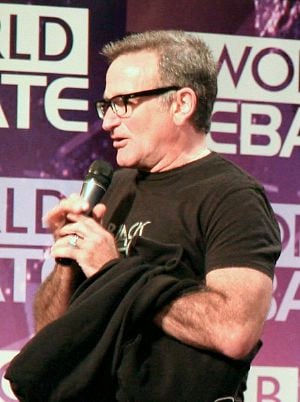
Williams was an enthusiast of both pen-and-paper role-playing games and video games, sometimes performing at consumer entertainment trade shows. His daughter Zelda was named after the title character from The Legend of Zelda, a family favorite video game series.[51]
Williams was a big fan of anime and collecting figures. His daughter described him as a "figurine hoarder," one of his figures being the fictional character Deunan Knute from the anime film Appleseed.[52]
He also became a devoted cycling enthusiast, having taken up the sport partly as a substitute for drugs. Eventually, he accumulated a large bicycle collection and became a fan of professional road cycling, often traveling to racing events. In 2016, his children donated 87 of his bicycles in support of the Challenged Athletes Foundation and Christopher & Dana Reeve Foundation.
Philanthropy
In 1986, Williams teamed up with Whoopi Goldberg and Billy Crystal to found Comic Relief USA. This annual HBO television benefit devoted to the homeless had raised $80 million by 2014. Bob Zmuda, creator of Comic Relief, explained that Williams felt blessed because he came from a wealthy home, but wanted to do something to help those less fortunate.[53]
Williams was a supporter of St. Jude Children's Research Hospital. He made benefit appearances to support literacy and women's rights, along with appearing at benefits for veterans. He was a regular on the USO circuit, where he traveled to 13 countries and performed to approximately 90,000 troops.[54] His USO performances included the U.S. troops stationed in Iraq and Afghanistan.[55]
In December 1999, he sang in French on the BBC-inspired music video of international celebrities doing a cover of The Rolling Stones single "It's Only Rock 'n Roll (But I Like It)" for the charity Children's Promise.[56]
In response to the 2010 Canterbury earthquake, he donated all proceeds of his Weapons of Self Destruction Christchurch performance to help rebuild the New Zealand city. Half the proceeds were donated to the Red Cross and half to the mayoral building fund.[57]
Legacy
Robin Williams was known for his improvisational skills and the wide variety of characters he created on the spur of the moment and portrayed on film, in dramas and comedies alike,[58] he is regarded as one of the best comedians of all time,[59] "the Muhammad Ali of comedy".[60] Looking over most of his filmography, one writer was "struck by the breadth" and radical diversity of most roles Williams portrayed.[61]
Although Williams was first recognized as a stand-up comedian and television star, he later became known for acting in film roles of substance and serious drama. He was considered a "national treasure" by many in the entertainment industry and by the public.[17]
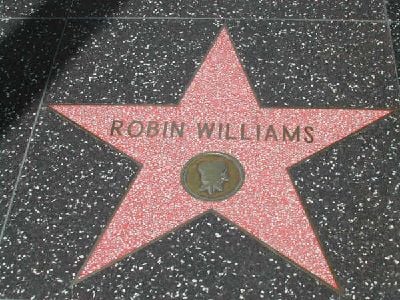
His on-stage energy and improvisational skill became a model for a new generation of stand-up comedians. Many comedians valued the way he worked highly personal issues into his comedy routines, especially his honesty about drug and alcohol addiction, along with depression. According to media scholar Derek A. Burrill, because of the openness with which Williams spoke about his own life, "probably the most important contribution he made to pop culture, across so many different media, was as Robin Williams the person."[62]
Williams created a signature free-form comedy persona so widely and uniquely identified that new comedians like Jim Carrey impersonated him, paving the way for the growing comedy scene which developed in San Francisco. Young comedians felt more liberated on stage by seeing his spontaneously diverse range: "one moment acting as a bright, mischievous child, then as a wise philosopher or alien from outer space".[63] According to Judd Apatow, the eclectic performer's rapid-fire improvisational style was an inspiration as well as an influence for other comedians, but his talent was so extremely unusual no one else could possibly attempt to copy it.[64]
His film performances often influenced other actors, both in and out of the film industry. Director Chris Columbus, who directed Williams in Mrs. Doubtfire, says watching him work "was a magical and special privilege. His performances were unlike anything any of us had ever seen, they came from some spiritual and otherworldly place."[65] Looking over most of his filmography, Alyssa Rosenberg at The Washington Post was "struck by the breadth" and radical diversity of most of his roles, writing that "Williams helped us grow up."[61]
Williams' death instantly became global news. The entertainment world, friends, and fans responded to his death through social and other media outlets.[66] His wife said: "I lost my husband and my best friend, while the world lost one of its most beloved artists and beautiful human beings. I am utterly heartbroken."[67] His daughter, Zelda Williams, responded to his death by saying the "world is forever a little darker, less colorful and less full of laughter in his absence."[68]
President Barack Obama released a statement upon Williams's death:
Robin Williams was an airman, a doctor, a genie, a nanny, a president, a professor, a bangarang Peter Pan, and everything in between ... He arrived in our lives as an alien—but he ended up touching every element of the human spirit. He made us laugh. He made us cry. He gave his immeasurable talent freely and generously to those who needed it most—from our troops stationed abroad to the marginalized on our own streets.[69]
Williams had been scheduled to be the "Blackmail" special guest for the final night of Monty Python's ten-date stage shows in London one month before his death—with one of his friends, Monty Python's Eric Idle—but cancelled, stating he was "suffering from severe depression" at the time. When the show was released on video, it was dedicated to Williams.[70]
At the United Nations Headquarters on August 12, 2014, Robin Williams was celebrated during the opening of the International Youth Day. In the presence of U.N. Secretary General Ban Ki Moon, Assistant Secretary General Thomas Gass paid tribute to Williams by standing on the pulpit of the ECOSOC Chamber and quoting Keating's lines from the 1989 film Dead Poets Society: "Dare to look at things in a different way!"[71] Many fans similarly paid tribute to Williams on television and social media with reenactments of Dead Poets Society's "O Captain! My Captain!" scene.[60]
Shortly after his death, Disney Channel, Disney XD, and Disney Junior all aired the original Aladdin commercial-free over the course of a week, with a dedicated drawing of the genie at the end of each airing before the credits. In honor of his theater work, the lights of Broadway were darkened for the evening of August 14, 2014. That night, the cast of the Aladdin musical honored Williams by having the audience join them in a sing-along of "Friend Like Me," an Oscar-nominated song originally sung by Williams in the 1992 film Aladdin.[72]
Fans of Williams created makeshift memorials at his star on the Hollywood Walk of Fame and at locations from his television and film career, such as the bench in Boston's Public Garden featured in Good Will Hunting; the Pacific Heights, San Francisco, home used in Mrs. Doubtfire; the sign for Parrish Shoes in Keene, New Hampshire, where parts of Jumanji were filmed; and the Boulder, Colorado, home used for Mork & Mindy.
During the 66th Primetime Emmy Awards on August 25, 2014, close friend and fellow comedian Billy Crystal presented a tribute to Williams, referring to him as "the brightest star in our comedy galaxy." Afterwards, some of Williams's best comedy moments were shown, including his first ever The Tonight Show appearance, indicating his great life in making people laugh.[73] Talk show hosts including David Letterman, Conan O'Brien, Seth Meyers, Jimmy Kimmel, and Jimmy Fallon paid tribute to Williams on their respective shows.[74]
On September 9, 2014, PBS aired a one-hour special devoted to his career,[75] and on September 27, 2014, dozens of leading stars and celebrities held a tribute in San Francisco to celebrate his life and career.[76]
A tunnel on Highway 101 north of the Golden Gate Bridge was officially named the "Robin Williams Tunnel" on February 29, 2016.[77]
In 2017, Sharon Meadow in San Francisco's Golden Gate Park, the home of the annual Comedy Day, was renamed Robin Williams Meadow.[78]
Awards and nominations
Throughout the course of his career Williams won numerous awards, including an Academy Award for Best Supporting Actor for his role in Good Will Hunting (1997). He also won six Golden Globe Awards, including Best Actor—Motion Picture Musical or Comedy for his roles in Good Morning, Vietnam (1987), The Fisher King (1991) and Mrs. Doubtfire (1993), along with the Special Golden Globe Award for Vocal Work in a Motion Picture[46] for his role Genie in Aladdin (1992), and the Cecil B. DeMille award in 2005.[79] He also received two Primetime Emmy Awards,[80] two Screen Actors Guild Awards, and five Grammy Awards.[81]
Notes
- ↑ Chicago Native Robin Williams Recalled ‘Good Times’ Growing Up Here CBS Chicago, August 11, 2014. Retrieved June 18, 2025.
- ↑ 2.0 2.1 2.2 2.3 2.4 Jesse Kornbluth, Robin Williams' Change Of Life: Fighting For His Family In His New Film, 'Mrs. Doubtfire,' And In Real Life New York Magazine, November 22, 1993. Retrieved June 18, 2025.
- ↑ Steve Rubenstein, Laurie Williams – comedian's mother San Francisco Chronicle, September 8, 2001. Retrieved June 18, 2025.
- ↑ 4.0 4.1 John Garcia and Eric Horng, Robin Williams left lasting impressions on childhood friends in Lake Forest, Lake Bluff ABC7, August 12, 2014. Retrieved June 18, 2025.
- ↑ Mary Ellen Moore, Robin Williams (Grosset & Dunlap, 1980, ISBN 978-0448263052).
- ↑ Valerie Strauss, How high school changed Robin Williams' life The Washington Post, August 11, 2014. Retrieved June 18, 2025.
- ↑ Gene N. Landrum, Paranoia & Power: Fear & Fame of Entertainment Icons (Morgan James Publishing, 2007, ISBN 1600372740).
- ↑ Megan Hansen, 'We knew him as a neighbor': Marin remembers Robin Williams Marin Independent Journal, August 11, 2014. Retrieved June 18, 2025.
- ↑ 9.0 9.1 9.2 9.3 9.4 9.5 9.6 Michael Kantor and Laurence Maslon, Make 'em Laugh: The Funny Business of America (New York: Twelve, 2008, ISBN 978-0446505314).
- ↑ 10.0 10.1 10.2 10.3 Christopher Reeve, Still Me (Random House, 1998, ISBN 978-0679452355).
- ↑ Robin Williams' son remembers his dad and Christopher Reeve's friendship Fox News, November 23, 2014. Retrieved June 18, 2025.
- ↑ Emily Herbert, Robin Williams: When the Laughter Stops 1951–2014 (John Blake, 2014, ISBN 978-1784183004).
- ↑ Dave Itzkoff, Robin (Picador, 2019, ISBN 978-1250214812).
- ↑ Mick LaSalle, Robin Williams gets his just due in documentary 'Come Inside My Mind' San Francisco Chronicle, July 11, 2018. Retrieved June 18, 2025.
- ↑ 15.0 15.1 15.2 15.3 15.4 Robin Williams Inside the Actors Studio, June 10, 2001. Retrieved June 18, 2025.
- ↑ 16.0 16.1 16.2 Decca Aitkenhead, Robin Williams: 'I was shameful, did stuff that caused disgust – that's hard to recover from' The Guardian, September 20, 2010. Retrieved June 18, 2025.
- ↑ 17.0 17.1 17.2 17.3 17.4 17.5 17.6 17.7 Laurence Goebel, The 1992 Playboy Interview With Robin Williams Playboy, January 1, 1992. Retrieved June 18, 2025.
- ↑ Robin Williams Told Friend 'Cycling Saved My Life' Post-Cocaine Days ABC News, August 13, 2014. Retrieved June 18, 2025.
- ↑ Robin Williams Comes Clean on 'GMA' ABC News, October 2, 2006. Retrieved June 18, 2025.
- ↑ Marcus Errico, Robin Williams Dead of Apparent Suicide at 63 Yahoo Entertainment, August 11, 2014. Retrieved June 18, 2025.
- ↑ Kathleen Doheny, Robin Williams' Heart Surgery: Road to Recovery WebMD Health News, March 24, 2009. Retrieved June 18, 2025.
- ↑ Robin Williams 'had Parkinson's' when he died BBC News, August 14, 2014. Retrieved June 18, 2025.
- ↑ Dave Itzkoff and Diana Fitzsimmons, Robin Williams, Oscar-Winning Comedian, Dies at 63 The New York Times, August 11, 2014. Retrieved June 18, 2025.
- ↑ Matthew Stucker, Robin Williams’ death ruled suicide CNN, November 11, 2014. Retrieved June 18, 2025.
- ↑ Marta Cooper, Robin Williams suffered from a common form of dementia that many people don’t know about Quartz, October 2, 2016. Retrieved June 18, 2025.
- ↑ 26.0 26.1 26.2 Susan Schneider Williams, The terrorist inside my husband's brain Neurology 87(13) (2016):1308-1311. Retrieved June 18, 2025.
- ↑ Death Certificate Indicates Robin Williams Cremated, Ashes Scattered In San Francisco Bay CBS Local, August 21, 2014. Retrieved June 18, 2025.
- ↑ Peter Hartlaub and Leah Garchik, Robin Williams' heart never strayed far from San Francsico SFGate, August 11, 2014. Retrieved June 18, 2025.
- ↑ 29.0 29.1 29.2 29.3 29.4 29.5 Gerald Nachman, Seriously Funny: The Rebel Comedians of the 1950s and 1960s (Back Stage Books, 2004, ISBN 978-0823047864).
- ↑ Leo Benedictus, Comedy gold: Robin Williams' A Night at the Met The Guardian, December 6, 2012. Retrieved June 18, 2025.
- ↑ Grammy Award Nominees 1980 – Grammy Award Winners 1980 Awards and Shows. Retrieved June 18, 2025.
- ↑ 32.0 32.1 Dee Lockett, Letterman Remembers the First Time He Met Robin Williams Slate, August 19, 2014. Retrieved June 18, 2025.
- ↑ 33.0 33.1 Emily Herbert, Robin Williams: When the Laughter Stops 1951–2014 (John Blake, 2014, ISBN 978-1784183004).
- ↑ Richard Zoglin, Comedy at the Edge: How Stand-up in the 1970s Changed America (Bloomsbury, 2009, ISBN 978-1582346250).
- ↑ 35.0 35.1 Jeff Giles, Robin Williams: Fears of a Clown Rolling Stone, August 12, 2014. Retrieved June 18, 2025.
- ↑ Andrew Gans, HBO to Air Robin Williams' Weapons of Self-Destruction, in December, according to the Hollywood Reporter Playbill, July 8, 2009. Retrieved June 18, 2025.
- ↑ Mork & Mindy RetroJunk, February 22, 2010. Retrieved June 18, 2025.
- ↑ Mary Forgione, The lighter side of Robin Williams, now at National Portrait Gallery Los Angeles Times, August 12, 2014. Retrieved June 18, 2025.
- ↑ Michael Anderegg (ed.), Inventing Vietnam: The War in Film and Television (Temple University Press, 1991, ISBN 0877228620).
- ↑ Jessica Goodman, Robin Williams and the 'O Captain' Scene That Inspired a Generation HuffPost, August 12, 2014. Retrieved June 18, 2025.
- ↑ Ryan Thomas Neale, Requiem for a Therapist: A Tribute to Robin Williams HuffPost, October 12, 2014. Retrieved June 18, 2025.
- ↑ Mike Medavoy, You're Only as Good as Your Next One: 100 Great Films, 100 Good Films, and 100 for Which I Should Be Shot (Atria Books, 2003, ISBN 0743400550).
- ↑ Eric Lax, Conversations with Woody Allen: His Films, the Movies, and Moviemaking (Knopf, 2009, ISBN 9781400031498).
- ↑ Soraya Nadia McDonald, Robin Williams almost didn't make 'Aladdin,' and a generation of children is grateful that he did The Washington Post, August 15, 2014. Retrieved June 18, 2025.
- ↑ Jeff Labrecque, Robin Williams in 'Aladdin': Animator Eric Goldberg remembers drawing Genie Entertainment Weekly, August 12, 2014. Retrieved June 18, 2025.
- ↑ 46.0 46.1 1993 Awards Golden Globes, USA. Retrieved June 18, 2025.
- ↑ Susan Veness, The Hidden Magic of Walt Disney World: Over 600 Secrets of the Magic Kingdom, Epcot, Disney's Hollywood Studios, and Animal Kingdom (Adams Media, 2020, ISBN 978-1507212561).
- ↑ Robin Williams was turned down for a key Harry Potter role News.com.au, January 3, 2017. Retrieved June 18, 2025.
- ↑ Michael Kuchwara, Still 'Waiting for Godot': Robin Williams, Steve Martin play it for laughs The Free Lance-Star, November 26, 1988. Retrieved June 18, 2025.
- ↑ Charles Isherwood, Ghostly Beast Burning Bright in Iraq The New York Times, March 31, 2011. Retrieved June 18, 2025.
- ↑ Marc Graser, Robin Williams to Be Memorialized in 'World of Warcraft' Variety, August 13, 2014. Retrieved June 18, 2025.
- ↑ Megan Peters, Robin Williams' Daughter Asks Fans To Help Identify His Massive Anime Collection Comic Book, May 17, 2018. Retrieved June 18, 2025.
- ↑ Carolyn M. Brown, Robin Williams, Whoopi Goldberg and Billy Crystal Raised $80 Million For Homeless Black Enterprise, August 12, 2014. Retrieved June 18, 2025.
- ↑ Mark Thompson, The Military Absolutely Loved Robin Williams TIME, August 12, 2014. Retrieved June 18, 2025.
- ↑ Phil Bronstein, Good Morning, Iraq San Francisco Chronicle, February 9, 2005. Retrieved June 18, 2025.
- ↑ Stones cover enters festive race BBC News, December 10, 1999. Retrieved June 18, 2025.
- ↑ Marc Greenhill, Robin Williams' quake donation Stuff, November 16, 2010. Retrieved June 18, 2025.
- ↑ Say What? Robin Williams' Most Iconic Character Voices VH1, August 12, 2014. Retrieved June 18, 2025.
- ↑ Emmie Martin, The 25 Funniest People Of All Time Business Insider, January 20, 2015. Retrieved June 18, 2025.
- ↑ 60.0 60.1 Michael Idato, Robin Williams death: Jimmy Fallon fights tears, pays tribute with 'Oh Captain, My Captain' The Sydney Morning Herald, August 14, 2014. Retrieved June 18, 2025.
- ↑ 61.0 61.1 Alyssa Rosenberg, How Robin Williams helped us grow up The Washington Post, August 11, 2014. Retrieved June 18, 2025.
- ↑ Gloria Goodale, Robin Williams: His unscripted riffs were not merely funny, but observant Christian Science Monitor, August 12, 2014. Retrieved June 18, 2025.
- ↑ Leon Rappoport, Punchlines: The Case for Racial, Ethnic, and Gender Humor (Praeger, 2005, ISBN 0275987647).
- ↑ David Browne, Robin Williams, 1951–2014 Rolling Stone, September 11, 2014. Retrieved June 18, 2025
- ↑ Valley native Chris Columbus speaks about life with Robin Williams The Vindicator, August 13, 2014. Retrieved June 18, 2025
- ↑ Jessica Derschowitz, Robin Williams tributes pour in from Hollywood CBS News, August 12, 2014. Retrieved June 18, 2025.
- ↑ Actor, Comedian Robin Williams Found Dead in Marin County Home NBC, August 11, 2014. Retrieved June 18, 2025.
- ↑ Robin Williams' Family: 'The World is Forever a Little Darker' Variety, August 12, 2014. Retrieved June 18, 2025.
- ↑ President Obama on the Passing of Robin Williams: "He Was One of a Kind" The White House, August 11, 2014. Retrieved June 18, 2025.
- ↑ Clark Collis, Monty Python reunion: Eric Idle on his late friend Robin Williams Entertainment Weekly, November 11, 2014. Retrieved June 18, 2025.
- ↑ International Youth Day Event: Mental Health Matters United Nations, August 12, 2014. Retrieved June 18, 2025.
- ↑ Randee Dawn, Robin Williams honored on Broadway with dimmed lights, 'Aladdin' tribute NBC News, August 14, 2014. Retrieved June 18, 2025.
- ↑ Ethan Sacks, Emmys 2014: Robin Williams given emotional tribute by good friend Billy Crystal New York Daily News, August 25, 2014. Retrieved June 18, 2025.
- ↑ Robin Williams late-night tributes: Jimmy Fallon, Seth Meyers and Conan O'Brien share memories The Washington Post, August 13, 2014. Retrieved June 18, 2025.
- ↑ Shelli Weinstein, Robin Williams Tribute Special to Air on PBS Variety, September 2, 2014. Retrieved June 18, 2025.
- ↑ Mike Barnes, Robin Williams' Life Celebrated at San Francisco Tribute Attended by Family, Industry Friends The Hollywood Reporter, September 27, 2014. Retrieved June 18, 2025.
- ↑ Alyssa Pereira, Robin Williams tunnel officially gets new signs SFGate, March 1, 2016. Retrieved June 18, 2025.
- ↑ Dominic Fracassa, Golden Gate Park meadow renamed for Robin Williams SFGate, December 22, 2017. Retrieved June 18, 2025.
- ↑ Robin Williams Golden Globe Awards. Retrieved June 18, 2025.
- ↑ Robin Williams Television Academy. Retrieved June 18, 2025.
- ↑ Robin Williams Grammy Awards. Retrieved June 18, 2025.
ReferencesISBN links support NWE through referral fees
- Anderegg, Michael (ed.). Inventing Vietnam: The War in Film and Television. Temple University Press, 1991, ISBN 0877228620
- David, Jay. The Life and Humor of Robin Williams. Harper Perennial, 1999. ISBN 0688152457
- Dougan, Andy. Robin Williams. Thunder's Mouth Press, 1999. ISBN 978-1560252139
- Herbert, Emily. Robin Williams: When the Laughter Stops 1951–2014. John Blake, 2014. ISBN 978-1784183004
- Itzkoff, Dave. Robin. Picador, 2019. ISBN 978-1250214812
- Kantor, Michael, and Laurence Maslon. Make 'em Laugh: The Funny Business of America. New York: Twelve, 2008. ISBN 978-0446505314
- Landrum, Gene N. Paranoia & Power: Fear & Fame of Entertainment Icons. Morgan James Publishing, 2007. ISBN 1600372740
- Lax, Eric. Conversations with Woody Allen: His Films, the Movies, and Moviemaking. Knopf, 2009. ISBN 9781400031498
- Medavoy, Mike. You're Only as Good as Your Next One: 100 Great Films, 100 Good Films, and 100 for Which I Should Be Shot. Atria Books, 2003. ISBN 0743400550
- Moore, Mary Ellen. Robin Williams. Grosset & Dunlap, 1980. ISBN 978-0448263052
- Nachman, Gerald. Seriously Funny: The Rebel Comedians of the 1950s and 1960s. Back Stage Books, 2004. ISBN 978-0823047864
- Rappoport, Leon. Punchlines: The Case for Racial, Ethnic, and Gender Humor. Praeger, 2005. ISBN 0275987647
- Reeve, Christopher. Still Me. Random House, 1998. ISBN 978-0679452355
- Veness, Susan. The Hidden Magic of Walt Disney World: Over 600 Secrets of the Magic Kingdom, Epcot, Disney's Hollywood Studios, and Animal Kingdom. Adams Media, 2020. ISBN 978-1507212561
- Zoglin, Richard. Comedy at the Edge: How Stand-up in the 1970s Changed America. Bloomsbury, 2009. ISBN 978-1582346250
External links
All links retrieved June 17, 2025.
- Robin Williams Find-a-Grave.
- Robin Williams at the Internet Movie Database
- Robin Williams PBS Pioneers of Television
- Robin Williams Biography.com
- Robin Williams and Lewy Body Dementia Lewy Body Dementia Association
Credits
New World Encyclopedia writers and editors rewrote and completed the Wikipedia article in accordance with New World Encyclopedia standards. This article abides by terms of the Creative Commons CC-by-sa 3.0 License (CC-by-sa), which may be used and disseminated with proper attribution. Credit is due under the terms of this license that can reference both the New World Encyclopedia contributors and the selfless volunteer contributors of the Wikimedia Foundation. To cite this article click here for a list of acceptable citing formats.The history of earlier contributions by wikipedians is accessible to researchers here:
The history of this article since it was imported to New World Encyclopedia:
Note: Some restrictions may apply to use of individual images which are separately licensed.
